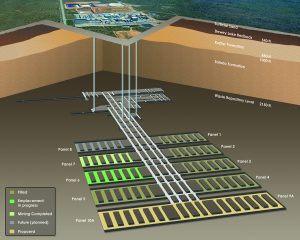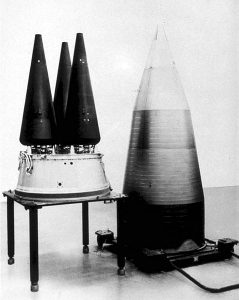2020
Nothing Found
It seems we can’t find what you’re looking for. Perhaps searching can help.
2019
“What we definitely don’t want to see is our continent going back to being a battlefield or place where other superpowers confront themselves — this belongs to a faraway history,”
– EU diplomatic chief Federica Mogherini
Congress, especially the Democratic-dominated House, may challenge Trump’s nuclear ambitions, and could try to block funding of missile programs that violate the INF. European officials, meanwhile, raised fears of a perilous escalation.
LANL’s New Director Discusses Changing Culture
BY REBECCA MOSS | santafenewmexican.com
Three months into his tenure as the 12th director of Los Alamos National Laboratory, Thomas Mason acknowledged that fixing the lab’s problems is going to take time, and setbacks could prevent Los Alamos from meeting key nuclear production goals.
But Mason said transforming the lab’s culture to one in which success is replicated — department to department, day after day — is the key to long-term success.
“The most important thing is to become more of a learning organization — where we can take practices [that work] and move them from one part of the organization to the next, and we can respond to stuff that happens … in a way that gets better over time,” Mason said in a recent interview.
“It is tricky,” he added. “There are 12,000 people who work at the lab every day.”
Russia Pulls Out of I.N.F. Treaty in ‘Symmetrical’ Response to U.S. Move
BY ANDREW E. KRAMER | nytimes.com February 2, 2019
MOSCOW — President Vladimir V. Putin of Russia, in a decision that was widely expected, suspended his country’s observance of a key nuclear arms control pact on Saturday in response to a similar move by the United States a day before.
But adding to a sense that the broader architecture of nuclear disarmament has started to unravel, Mr. Putin also said that Russia would build weapons previously banned under the treaty and would no longer initiate talks with the United States on any matters related to nuclear arms control.
The Trump administration withdrew from the treaty, a keystone of the late Cold War disarmament pacts known as the Intermediate-Range Nuclear Forces Treaty, saying that Russia had been violating it for years. The decision holds the potential to initiate a new arms race, not only with Russia, but also China, which was never a signatory to the 1987 treaty.
WIPP Receives Notice of Upcoming Investigation for Chemical Overexposures to Workers

On January 29, 2019, DOE’s Office of Enterprise Assessments notified Nuclear Waste Partnership, LLC (NWP), the managing and operating contractor for the Waste Isolation Pilot Plan (WIPP), of its intent to investigate heat stress-related events and chemical exposures at WIPP. The events, occurring from July through October 2018, include multiple overexposures to hazardous chemicals, including carbon tetrachloride, nitrogen dioxide, and sulfur dioxide, as well as a series of heat-stress incidents.
The U.S. And Russia Are Stocking Up On Missiles And Nukes For A Different Kind Of War
NPR, February 1, 2019, 6:07 AM ET By GEOFF BRUMFIEL
The true battle over these new weapons may end up in Congress. While Republicans seem ready to back the Trump administration’s request for more battlefield nukes, the newly elected Democratic majority in the House of Representatives seems intent on blocking them.
“We do not view nuclear weapons as a tool in warfare,” Adam Smith, now the Democratic chair of the House Armed Services Committee, said in a speech in November. “It makes no sense for us to build low-yield nuclear weapons.”
NNSA’s pet ‘Interoperable Warhead’ is DEAD

The study in question came about because Marylia Kelley, of Tri-Valley CARES, and NukeWatch’s Director, Jay Coghlan, suggested to congressional staff that it be done. But they wanted to ask independent scientists (the JASONs) to do it – instead just NNSA did it. And NNSA dodged the central congressional requirement to compare the benefits and costs of the Interoperable Warhead vs a “conventional” life extension program for the Air Force’s W78 ICBM warhead. NNSA simply said a conventional life extension program would not meet military requirements and therefore summarily dismissed it (no further explanation). Marylia and Jay had the opportunity to discuss this with the relevant congressional staffer who said this ain’t over.
Trump makes it official: The US is pulling out of a Cold War-era nuclear weapons treaty with Russia
The world’s two greatest nuclear powers are set to pull out of a crucial nuclear weapons treaty beginning this weekend. The Intermediate-Range Nuclear Forces Treaty, prohibits the production or testing of ground-launched cruise missiles with a range of 300 to 3,400 miles.
Trump says the U.S. will withdraw from the INF Treaty on Saturday.
BY AMANDA MACIAS | @amanda_m_macias | cnbc.com February 1, 2019
Brendan Smialowski | AFP | Getty ImagesRussia’s President Vladimir Putin listens while U.S. President Donald Trump speaks during a press conference in Helsinki, Finland.
WASHINGTON — President Donald Trump said Friday that the United States is ready to withdraw from a crucial nuclear weapons treaty with Russia on Saturday, a move that has sparked concerns of a budding arms race between the world’s two biggest nuclear powers.
The announcement comes a day after Russia and the United States said that discussions to save the Intermediate-Range Nuclear Forces Treaty had failed.
“Tomorrow, the United States will suspend its obligations under the INF Treaty and begin the process of withdrawing … which will be completed in six months unless Russia comes back into compliance by destroying all of its violating missiles, launchers, and associated equipment,” Trump said in a statement.
MERKLEY, SENATORS INTRODUCE BILL TO PREVENT NUCLEAR ARMS RACE
 merkley.senate.gov Thursday, January 31, 2019 WASHINGTON, D.C.
merkley.senate.gov Thursday, January 31, 2019 WASHINGTON, D.C.
“There’s a reason that kids today don’t do duck-and-cover drills in schools and that nobody has bomb shelters in their backyards anymore. That reason is because of key agreements like the Intermediate-Range Nuclear Forces Treaty and the New Strategic Arms Reduction Treaty,” said Merkley. “This era of stability is put at great risk by President Trump’s decision to unilaterally pull out of the INF Treaty. This decision ignores all the lessons from the Cold War. There is no doubt that Russia is violating the INF Treaty, but the right path forward is to work to bring them back into compliance, not free them to produce more nuclear weapons. Blowing up the Treaty risks the proliferation of nuclear-capable systems by Russia, threatening Europe and jeopardizing decades of bipartisan efforts to reduce nuclear dangers with Russia.”
“A nuclear arms race would endanger the entire world and threaten every single person in our country, and Congress has a responsibility to ensure that President Trump does not start one. President Trump’s imminent unilateral withdrawal from a bipartisan weapons treaty with Russia, without consulting Congress, would mean the Prevention of Arms Race Act is more important than ever,” said Gillibrand. “A reckless withdrawal would further damage our relationships with our allies, Russia would not be legally constrained from deploying larger numbers of their previously prohibited missiles, and the world would be much less safe. I urge my colleagues to support this bill to prevent a new arms race, and I will continue to do everything I can to keep all Americans safe.”
“Pulling out of the INF Treaty plays squarely into Russia’s hands while undermining America’s security and betraying our NATO allies,” Markey said. “The Trump administration needs to work more closely with our NATO allies to force Russia back into compliance. And as the chance of a confrontation between American and Chinese forces rises the Indo-Pacific, it makes little sense to add further ambiguity over whether U.S. missiles stationed around the region are nuclear-armed. This legislation will help ensure that we don’t match two major adversaries missile-for-missile, trigger a new nuclear arms race, and incur unacceptable amounts of risk in an already tenuous security environment.”
“If Donald Trump walks out of the INF Treaty, he will risk a new destabilizing and costly arms race and antagonize important allies,” said Wyden. “The administration should instead be working with European allies to pressure Russia back into compliance.”
The Senators’ legislation comes in advance of the Trump Administration’s expected action this weekend to unilaterally withdraw the United States from the Intermediate-Range Nuclear Forces Treaty (INF) treaty. The State Department set a February 2, 2019 deadline for Russia to return to compliance with the Treaty after a hasty and un-vetted declaration by President Trump in October that the United States intended to withdraw from the landmark treaty with Russia. The INF was originally signed by President Reagan and Soviet General Secretary Mikhail Gorbachev in 1987.
Opponents fight back against WIPP permit change on waste volume tracking, appeal filed
“Scott Kovac of Nuclear Watch New Mexico said the change should not have been approved without an explanation from the DOE about how to address lost space after a contamination incident in 2014 that led to a three-year closure of the facility.”
By Adrian Hedden Carlsbad Current-Argus
Two advocacy groups in New Mexico filed a legal appeal Thursday seeking to undo a New Mexico Environment Department order that allows the Energy Department to change the way it records underground transuranic waste volume at its Waste Isolation Pilot Plant (WIPP) near Carlsbad.
The Southwest Research and Information Center (SRIC) and Nuclear Watch New Mexico (NWNM) filed their notice of appeal in the New Mexico Court of Appeals to block the modification to WIPP’s state hazardous waste permit.
While it technically takes effect this month, as a practical matter the new counting system won’t be instituted right away because DOE has not drafted its policy on implementation, said SRIC Administrator Don Hancock by email.
A Dec. 21 order from then-state Environment Department Secretary Butch Tongate authorized DOE to stop recording empty spaces between container drums as waste. The order adopted the findings of state Hearing Officer Max Shepherd, who recommended waste volume counted against the disposal cap set by the 1992 WIPP Land Withdrawal Act should cover only the actual waste inside containers.
“The modification is contrary to federal law, changes 20 years of practice in the WIPP Permit and operations, ignores the record in the proceeding including testimony in three days of hearings, and violates the New Mexico-DOE Consultation and Cooperation Agreement,” Hancock said in a press release.
He called on New Mexico’s new governor and environment chief not to back the change in court, but rather overturn it. Given the official implementation date is Jan. 20, any administrative delay or rejection would happen soon, he added.
2018
Nothing Found
It seems we can’t find what you’re looking for. Perhaps searching can help.
2017
Nothing Found
It seems we can’t find what you’re looking for. Perhaps searching can help.
2016
Nothing Found
It seems we can’t find what you’re looking for. Perhaps searching can help.
2015
Nothing Found
It seems we can’t find what you’re looking for. Perhaps searching can help.


